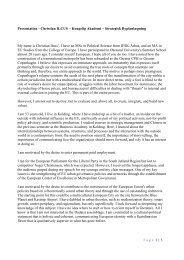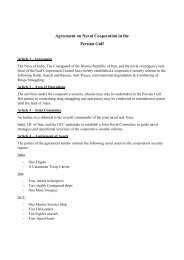china IR rev final sept 2023
This is the fourth and penultimate edition of my annotated bibliography on China international relations, art and Philosophy. from the books I distill policy relevant ideas for use and comsideration of policymakers after the ratification of the Cai, when the relatioship willl have to be managed
This is the fourth and penultimate edition of my annotated bibliography on China international relations, art and Philosophy. from the books I distill policy relevant ideas for use and comsideration of policymakers after the ratification of the Cai, when the relatioship willl have to be managed
Create successful ePaper yourself
Turn your PDF publications into a flip-book with our unique Google optimized e-Paper software.
for partnership having indicated the need for addressing the Afghan situation more forcefully in return for engagement<br />
on Xinjiang, a stumbling block on the road to ratification of the EU-China Comprehensive Agreement on Investment<br />
(CAI).<br />
Steve Chan Rumbles of Thunder Power Shifts and the danger of Sino-<br />
American War, Columbia UP, <strong>2023</strong>.<br />
Steve Chan of Colorado University picks up the scholarly conversation on power transitions where Robert Ross and<br />
Zhu Feng in China’s Ascent stopped while relating to Allison’s Destined for War. He argues that power shifts matter<br />
and may account for why international relations lead to tensions, though not in the manner power transition theory<br />
predict. The state’s policy capacity and capabilities are more critical, while the US preponderance is longer-lived than<br />
assumed. This means self-fulfilling prophecies of a coming war between the US and China are misperceived. Domestic<br />
political alignment and policies are the primary determinants of foreign policy. The implication is that the growth<br />
policies in other countries are more significant factors than the rise of China per se. Taiwan constitutes a fulcrum for the<br />
US-China rivalry. Thus, there are multiple paths to war, argues Chan. The policy choices and agency of executives and,<br />
consequently, the nature of decision-making make the difference rather than structural forces. Thus, on the management<br />
of change, Chan quotes T.V. Paul: “The process of accommodation in international relations is exceptionally<br />
complicated, as it involves status adjustment, the sharing of leadership roles through the accordance of institutional<br />
membership and privileges, and acceptance of spheres of influence: something established powers rarely offers to newcomers”<br />
(p.17). Professor Chan quotes Allison, saying Americans should be careful about wishing Chinese to be “more<br />
like you,” giving democracies are more prone to warfare than more isolated elites. Even so, in Chan’s view Chinese<br />
leader’s “win-set” has shrunk, while the “selectorate” that the need to answer to has grown (p.27). Win set refers to the<br />
range of politically acceptable and feasible foreign deals given a leader’s domestic environment. Selectorate refers to<br />
the size of the leader’s political constituency and the minimum number of supporters required for the leader to retain<br />
power. Thus, the greater the constituency, the greater the political constraints and the smaller the win set. Chinese and<br />
American leaders are subject to more constraining predicaments in favor of what Chan describes as a desirable bilateral<br />
deal 23 .<br />
Li Xing China-EU relations in a New era of global transformation,<br />
Routledge, <strong>2023</strong>.<br />
The editor Li Xing has gathered several experts to investigate key issues in the EU-China relationship. EU-China is<br />
increasingly complex and affected by several inter-related factors, such as China’s global rise, growing China-US<br />
competition, US global withdrawal, the China-Russia comprehensive alliance”, US-EU frictions, and Brexit, Li Xing<br />
claims. The book highlights the struggles of both China and the EU for a dynamic and durable mode of engagement to<br />
achieve a balance between challenges and opportunities and between partnership and rivalry. International contributors<br />
explore conceptualizing EU-China relations and identifying their differences and commonalities, such as the EU’s role<br />
in China’s foreign policy process and how the EU works with China as a strategic partner. Finally, it analyses China’s<br />
and the EU’s perceptions of their current and future roles.<br />
Sebastian Biba & Reinhard Wolf Europe in an Era of Growing Sino-<br />
American Competition: Coping with an unstable Triangle, <strong>2023</strong>.<br />
This book pleads how Europe should position itself in an era of growing Chinese-American rivalry. First, this book<br />
explores the current relationship and ongoing dynamics between three of the most influential players in today’s<br />
international relations – the USA, China, and Europe. It claims that the intensifying antagonism between Washington<br />
and Beijing requires a paradigm shift in European strategic thinking and takes a trilateral perspective in analyzing key<br />
issues areas, such as trade, technology, investment, climate change, the BRI, sub-national contacts, maritime security<br />
and nuclear non-proliferation. Using this analysis, the work seeks to offer original policy recommendations that respond<br />
to several dilemmas Europe can no longer avoid, including the trade-off between European interests and values in a<br />
harsher global environment, the question of whether Europe should align with one of the superpowers, Europe’s<br />
military dependence on the US pivoting to the Asia-Pacific, and possible trade-offs between global and regional<br />
23<br />
Unpacking “the West”: Divergence and Asymmetry in Chinese Public Attitudes Towards Europe and the United<br />
States (sagepub.com)<br />
Page 20 | 29








